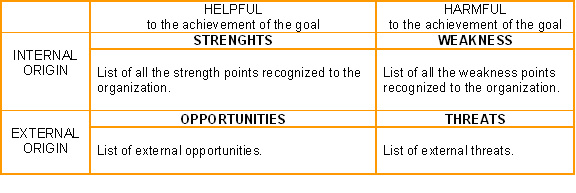Difference between revisions of "SWOT Analysis"
From Learning and training wiki
Chantal joly (Talk | contribs) |
Chantal joly (Talk | contribs) |
||
| Line 16: | Line 16: | ||
=='''Step by Step'''== | =='''Step by Step'''== | ||
* A brainstorming should be conducted, in order to get informations about the stengths of the organization. The facilitator distribute paper card and ask participants to write what are the things that they consider as strengths points, everyone is allowed to write as many things as wanted. The facilitator then collects all the paper on place them on a board. He eliminates all redundant inputs. | * A brainstorming should be conducted, in order to get informations about the stengths of the organization. The facilitator distribute paper card and ask participants to write what are the things that they consider as strengths points, everyone is allowed to write as many things as wanted. The facilitator then collects all the paper on place them on a board. He eliminates all redundant inputs. | ||
| − | * The same procedure should be repeated for weaknesses, opportunities and threats. Categorize all the Swot factors into a | + | * The same procedure should be repeated for weaknesses, opportunities and threats. Categorize all the Swot factors into a [[#Job Aid|Swot matrix]] and work to build consensus around the placement of them. |
* The situation is then analyzed by looking for ways in which the group/organization’s strengths can be built on to overcome identified weaknesses, and opportunities can be taken to minimize threats; | * The situation is then analyzed by looking for ways in which the group/organization’s strengths can be built on to overcome identified weaknesses, and opportunities can be taken to minimize threats; | ||
* A strategy for making improvements is formulated and subsequently developed using a number of additional planning tools. <ref>[http://www.quickmba.com www.quickmba.com] (13 August 2008), [http://www.wikipedia.org Wikipedia] (13 August 2008), Project Cycle Management Guidelines, European Commission, 2004</ref> | * A strategy for making improvements is formulated and subsequently developed using a number of additional planning tools. <ref>[http://www.quickmba.com www.quickmba.com] (13 August 2008), [http://www.wikipedia.org Wikipedia] (13 August 2008), Project Cycle Management Guidelines, European Commission, 2004</ref> | ||
Revision as of 14:11, 13 October 2008
| A tool that identifies the Strengths, Weaknesses, Opportunities and Threats of an organization. Specifically, SWOT is a basic, straightforward model that assesses what an organization can and cannot do as well as its potential opportunities and threats. The SWOT analysis takes the information from an environmental analysis and separate it into internal (strengths and weaknesses) and external issues (opportunities and threats). Once this is completed, the SWOT analysis determines what can be of assistance to the organization in accomplishing its objectives, and what obstacles must be minimized to achieve desired results. [1] |
|
Strengths and opportunities are identified as enhancers to desired performance, while weaknesses and threats are inhibitors.[2]
Step by Step
SWOT MatrixJob Aids |
References
- ↑ www.answers.com (20 August 2008), www.netmba.com (20 August 2008), en.wikipedia.org (20 August 2008)
- ↑ www.businessballs.com (3 October 2008), web.worldbank.org
- ↑ www.quickmba.com (13 August 2008), Wikipedia (13 August 2008), Project Cycle Management Guidelines, European Commission, 2004
